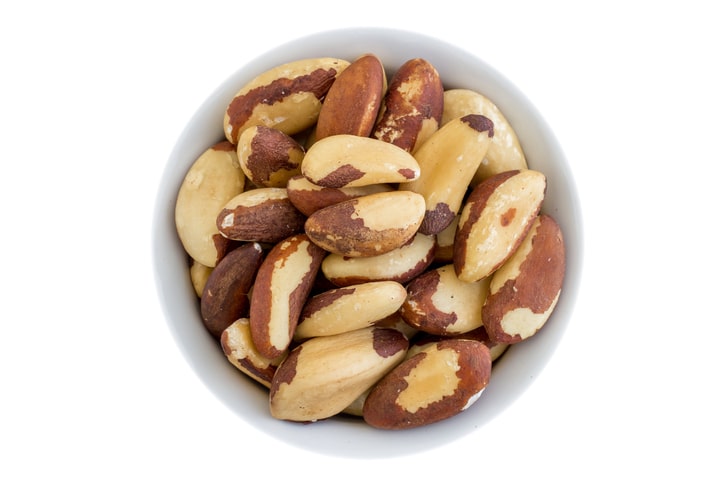More than 3 million Americans have been told by their doctors that they have a nut allergy.
Typically, they are diagnosed after eating something containing nuts and having a reaction. When they go to their doctor, they are given a skin prick or blood test to confirm their sensitivity.
If the test is positive, their doctor tells them to stay away from all nuts. The conventional medical wisdom is that if you’re allergic to one kind of nut, you’re likely sensitive to others.1
A new study shows this is bad advice.
It found that 86% of people allergic to one kind of nut can safely eat all others.2
If you are allergic to peanuts—the most common nut allergy—the chances are even greater that you’ll have no problem with other nuts. The study found you have a 96% chance of being fine eating other nuts, such as walnuts, pecans, and cashews.
Recommended for You: Four-in-One Joint Solution Gives You All-Day Mobility
It’s a super-supplement that addresses not just one, but all four major joint concerns.. It can help soothe discomfort, balance inflammation, lubricates joints and help support new cartilage growth.
You could dance the night away with your loved ones. Work in the garden. And go for long walks. All without aches and stiffness. One user wrote to us: “My joints and hips are much less achy and sore.”*
Find out how to get your hands on this joint-health super-solution HERE. It also includes a better form of glucosamine to support softer cushion between your joints.
*User was given a coupon toward a future purchase to share his experience
The study was conducted by the American College of Allergy, Asthma and Immunology (ACAAI). It looked at 109 people who were allergic to one type of nut.
Scientists gave subjects something called an “oral food challenge.” This is where the patient is fed a possible allergen while under medical supervision to see if a reaction occurs.
They tested patients with a confirmed allergy to one kind of nut and gave them oral food challenges for other varieties. The tests included almonds, cashews, walnuts, hazelnuts, pecans, pistachios, and Brazil nuts.3 The overwhelming majority had no problems after eating other nuts.
Dr. Matthew Greenhawt is chairman of the ACAAI Food Allergy Committee. He is a co-author of the study. “The practice of avoiding all peanut and tree nuts because of a single-nut allergy may not be necessary,” he said.
The study also found that skin prick and blood tests are unreliable. Even when a subject tested positive for a nut allergy in one of these tests, 61% of the time they were able to eat the nut with no ill effects, the research showed.
Dr. Christopher Couch is another study co-author. He added: “Too often, people are told they’re allergic to tree nuts based on a blood or skin prick test. They take the results at face value and stop eating all tree nuts when they might not actually be allergic.”
The study was published recently in the Annals of Allergy, Asthma and Immunology.4
If you are diagnosed with a nut allergy, confirm the results by undergoing an oral challenge. Any allergist can administer this test.
Nuts: One of the Best Things You Can Eat
You don’t want to limit your nut consumption if you don’t have to. They are among the world’s healthiest foods. A recent study found that eating just three-quarters of an ounce—about a handful—a day lowers your risk for just about every major disease.
The massive analysis included health data from 819,000 people. It found eating nuts every day reduces:
- Heart disease risk by nearly 30%
- Cancer risk by 15%
- Respiratory disease mortality by 50%
- Diabetes death risk by about 40%
- Overall death risk by 22%
Some nuts are more nutritious than others. Peanuts are technically not a nut. They are a legume… And they aren’t that nutritious.
5 Healthiest Kinds of Nuts
Here are the five healthiest nuts:
- Almonds. Loaded with magnesium and fiber, they aid in weight loss. A study found that eating a quarter cup a day leads to a 62% greater reduction in weight among obese dieters. Half a cup of almonds a day has been found to cut the risk of colon cancer.
- Walnuts. They protect your heart and brain. One study found men getting 30% of their dietary fat from walnuts lowered their cholesterol by 10% in a month. Walnuts are also rich in omega-3 fatty acids, which help keep your brain sharp.
- Pistachios. A Spanish study found a diet high in pistachios helps make subjects’ bodies almost 80% more efficient at using glucose. It means they have a lower risk of diabetes. Pistachios are also a good source of antioxidants that lower your lung cancer risk.
- Cashews. They’re a good source of magnesium. It’s a mineral that fights cancer and prevents diabetes. One study of over 80,000 people found eating cashews once a week lowers gallstone risk by 25%.
- Brazil Nuts. They are packed with selenium. This nutrient boosts your immunity and lowers risk of heart disease by over 20%. Men benefit the most. That’s because the selenium in just one to two Brazil nuts raises testosterone production.5
One more thing…don’t settle for the stuff in the grocery store snack aisles. Buy organic, raw, unsalted nuts whenever possible.
Like this Article? Forward this article here or Share on Facebook.
References:
1http://acaai.org/news/are-tree-nut-allergies-diagnosed-too-often
2http://www.annallergy.org/article/S1081-1206(17)30112-6/abstract
3http://www.annallergy.org/article/S1081-1206(17)30112-6/abstract
4https://www.institutefornaturalhealing.com/2016/12/eat-handful-of-nuts-every-day/
5https://www.eurekalert.org/pub_releases/2017-03/acoa-atn032117.php

